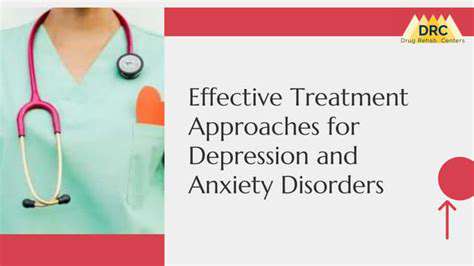Understanding Globus Anxiety: Symptoms and Treatment Approaches
Effective Treatment Approaches for Globus Anxiety

Medical Treatments
Medication plays a crucial role when physiological factors dominate. Proton pump inhibitors effectively manage acid reflux cases, while muscle relaxants may help tense throat muscles. Combining medication with behavioral approaches often yields optimal results, though all treatments should follow professional medical advice.
For anxiety-driven cases, short-term anti-anxiety medications might provide relief while patients develop coping strategies. However, medication alone rarely provides lasting solutions without accompanying lifestyle modifications.
Therapeutic Techniques
Cognitive behavioral therapy has demonstrated particular effectiveness for globus sensations rooted in anxiety. This approach helps patients identify and modify thought patterns that exacerbate physical symptoms. Many therapists incorporate specific throat relaxation exercises into treatment plans.
Mindfulness-based stress reduction teaches patients to observe sensations without anxious reaction. This technique proves valuable for breaking the cycle of symptom perception and anxiety amplification.
Lifestyle Adjustments
Simple daily changes often bring significant relief. Proper hydration maintains throat moisture, while humidifiers combat dry air. Dietary modifications like reducing acidic foods help those with reflux components.
Stress management through regular exercise, adequate sleep, and relaxation practices addresses underlying contributors. Many patients find voice therapy helpful for learning proper throat muscle control.
Integrative Approaches
Complementary methods like acupuncture show promise for some patients, particularly when combined with conventional treatments. These integrative approaches work best as part of comprehensive care plans developed with healthcare providers.
Herbal remedies like slippery elm or marshmallow root may soothe irritated throats, though scientific evidence remains limited. Patients should consult doctors before trying alternative treatments to avoid interactions.
Seeking Professional Help for Globus Anxiety

When to Consult Specialists
Persistent symptoms warrant professional evaluation to rule out serious conditions. Early consultation becomes crucial when symptoms accompany weight loss, pain, or swallowing difficulties. Otolaryngologists specialize in throat disorders, while gastroenterologists address reflux-related cases.
Mental health professionals should evaluate cases where anxiety appears primary. Many clinics now offer integrated care with multiple specialists collaborating on treatment plans.
Diagnostic Procedures
Comprehensive evaluation typically begins with detailed history and physical examination. Flexible laryngoscopy allows direct throat visualization, while pH monitoring assesses possible reflux. Imaging studies like CT scans evaluate structural concerns when indicated.
Treatment Planning
Effective management requires personalized approaches addressing each patient's unique contributing factors. Multidisciplinary teams often develop the most successful treatment strategies, combining medical, psychological, and lifestyle interventions.
Regular follow-up ensures treatment efficacy and allows for adjustments. Patients should maintain open communication with providers about symptom changes or treatment side effects.
Patient Education
Understanding the condition reduces anxiety about symptoms. Providers should explain the benign nature of most globus cases while emphasizing the importance of compliance with prescribed treatments.
Support groups help patients share coping strategies. Educational materials about throat anatomy and function often demystify symptoms, reducing health-related anxiety.
Long-term Management
For chronic cases, developing sustainable coping mechanisms proves essential. Many patients benefit from periodic booster therapy sessions to maintain progress. Lifestyle modifications should become permanent habits rather than temporary fixes.
Relapse prevention strategies help patients recognize early warning signs and implement learned techniques before symptoms escalate. Mindfulness practices often serve as valuable long-term tools for symptom management.